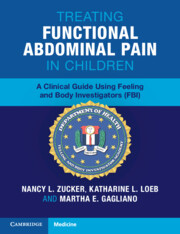 Treating Functional Abdominal Pain in Children
Treating Functional Abdominal Pain in Children Book contents
- Treating Functional Abdominal Pain in Children
- Treating Functional Abdominal Pain in Children
- Copyright page
- Dedication
- Contents
- Acknowledgements
- Part I The Background Science Behind Feeling and Body Investigators
- Part II A Session-by-Session Guide to Feeling and Body Investigators
- Chapter 6 Session 1: Initiation into Feeling and Body Investigators
- Chapter 7 Session 2: The Eats
- Chapter 8 Session 3: The Explosions
- Chapter 9 Session 4: The Zoomies and the Shakies, Part 1
- Chapter 10 Session 5: The Blahs
- Chapter 11 Session 6: The Ouchies
- Chapter 12 Session 7: The Drowsies
- Chapter 13 Session 8: The Zoomies and the Shakies, Part 2
- Chapter 14 Session 9: The Soothies
- Chapter 15 Session 10: The Celebration… and the Next Leg of Our Journey
- Part III Sample Workbook Pages, Handouts, and Additional Resources for Feeling and Body Investigators
- Index
Chapter 8 - Session 3: The Explosions
from Part II - A Session-by-Session Guide to Feeling and Body Investigators
Published online by Cambridge University Press: 18 November 2023
- Treating Functional Abdominal Pain in Children
- Treating Functional Abdominal Pain in Children
- Copyright page
- Dedication
- Contents
- Acknowledgements
- Part I The Background Science Behind Feeling and Body Investigators
- Part II A Session-by-Session Guide to Feeling and Body Investigators
- Chapter 6 Session 1: Initiation into Feeling and Body Investigators
- Chapter 7 Session 2: The Eats
- Chapter 8 Session 3: The Explosions
- Chapter 9 Session 4: The Zoomies and the Shakies, Part 1
- Chapter 10 Session 5: The Blahs
- Chapter 11 Session 6: The Ouchies
- Chapter 12 Session 7: The Drowsies
- Chapter 13 Session 8: The Zoomies and the Shakies, Part 2
- Chapter 14 Session 9: The Soothies
- Chapter 15 Session 10: The Celebration… and the Next Leg of Our Journey
- Part III Sample Workbook Pages, Handouts, and Additional Resources for Feeling and Body Investigators
- Index
Summary
Clinicians begin the Explosions! with familiar routines: a Henry Heartbeat activity, reviewing homework and adding data to the Body Map, and a new ritual: checking in with our energy and seeing if we need a snack. New characters related to processes of eating and digesting food are introduced: Victor Vomit, Gaggy Greg, Gordon Gotta Go. Investigations explore activities that may induce gagging. Equipped with garbage cans and paper towels, families are prepared for any result of these disgusting but fun investigations. Body Brainstorms explore questions such as who passes the most gas in the family and what foods produce the smelliest farts. Clinicians introduce a decision-tree in the Body Clues Worksheet that helps family members notice their body sensations, figure out what those sensations may mean (e.g., is Betty the Butterfly telling me I am excited?), and design a corresponding investigation (e.g., what happens to Betty the Butterfly if I take some deep breaths while facing my fears?). Families practice using their Body Clues Worksheet to review the highs and lows of the day or to explore the meaning of an intense moment. Armed with these new investigative tools, families are prepared for any intense situation even if it’s disgusting!
Keywords
- Type
- Chapter
- Information
- Treating Functional Abdominal Pain in ChildrenA Clinical Guide Using Feeling and Body Investigators (FBI), pp. 66 - 77Publisher: Cambridge University PressPrint publication year: 2023


